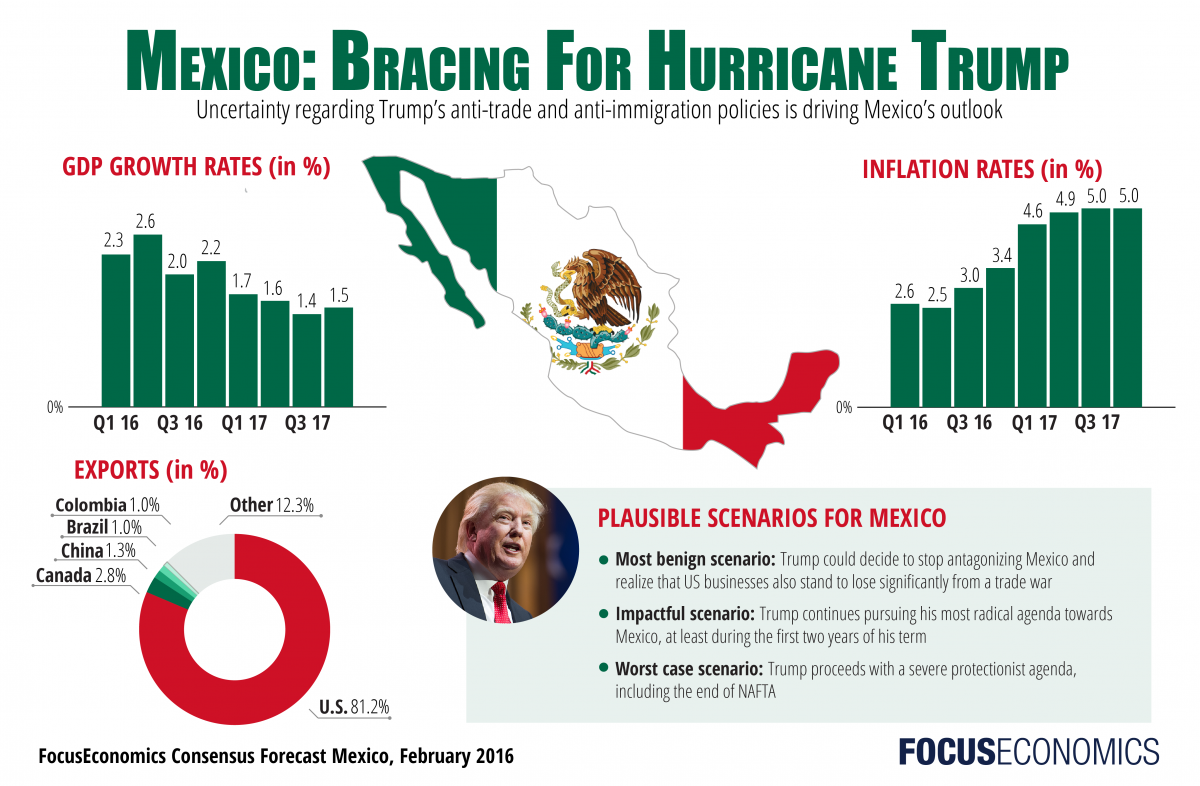
Eduardo Vázquez is a macroeconomic analyst specialized in Mexico and the United States with vast experience in finance. He holds a B.A. in Economics from the National Autonomous University of Mexico and is currently the Technical Secretary Economics & Finance of the American Chamber of Commerce of Mexico.
FE: Few countries would be as vulnerable to Trump’s Presidency as Mexico. How has Mexico’s economic outlook changed over the past weeks? What is your outlook for this year?
Eduardo Vázquez: The change of government in the United States was one of the factors that has caused the downward revision to our Mexico GDP growth forecast to 1.1% in 2017. Even before the elections, exports declined, investment was not rebounding, and fiscal and monetary policies were setting an increasingly restrictive tone, which implies slower economic growth. The increase in uncertainty led to a substantial depreciation of the Mexican peso, which, coupled with the increase in gasoline prices at the beginning of 2017, has caused us to revise our 2017 inflation forecast upward 5.2%.
On the expenditures side, we believe that consumption will continue to expand, albeit at a much weaker pace. The ratings agencies have downgraded Mexico’s sovereign rating to a negative outlook. The current account deficit of above 3% of GDP, the increase in public debt by more than 50% of GDP and the increase in government debt are imbalances that the government has not been able to address and it is important to do so to protect the country’s macroeconomic stability.
FE: Mexico’s economy relies heavily on the North American Free Trade Agreement (NAFTA) and Trump has pledged to renegotiate it. Is it likely that NAFTA will be renegotiated in the first half of 2017?
EV: Like any other instrument, NAFTA can be improved and a renegotiation entails an opportunity to modernize and strengthen it. What is important in the process is to seek an agreement that benefits all parties. Accordingly, the Secretariat for Economic Affairs and the Strategic Advisory Council on International Denunciations (CCENI) – led by the Business Coordinating Council (CCE) – has held meetings to create a common agenda for the renegotiation of NAFTA and to generate new business opportunities in other countries.
NAFTA is an unprecedented trade agreement, it has benefited all parties and it placed Mexico and North America on the international agenda. This integration cannot be reversed, so it is necessary to continue strengthening our relationship as strategic partners.
Click on the image to open a full-size version
FE: Mexico’s future relies on North American integration. Is that vulnerability now for Mexico?
EV: Mexico now has the opportunity to look towards its domestic market and towards new markets abroad. Since 80% of our exports are shipped to the U.S., the Mexican bilateral trade behavior is closely linked to the U.S. economic cycle. Strengthening the domestic market would help us ignite local economic development.
To be a more competitive economy, we must create better conditions for investment and business, that is, an environment conducive to business growth, the creation of formal jobs and the development of talent.
FE: In your opinion, how can the Mexican government respond to changes proposed by the new U.S. administration?
EV: The current economic context demands the molding and deepening of our trade relations, so we face the challenge of responsibly modernizing the instruments that would allow us to strengthen the competitiveness and development of our economies.
The relationship between Mexico and the United States has strengthened substantially over the last few years. A clear example of this is the commercial exchange between Mexico and the U.S. in 2015 equivalent to 532 billion dollars on which 6 million jobs in the United States directly depend on today.
Faced with an increasingly competitive globalized market, we recognize the government’s efforts to promote Mexico’s presence and active participation in the world’s leading economies, including our main trading partner, the United States.
Given the changes proposed by the United States, the Mexican government has acted responsibly, and we trust that, prior to the renegotiation of NAFTA, it will lay the groundwork for a constructive dialogue, based on the collaboration between the Ministry of Economy and the Strategic Consultative Council for International Negotiations.
FE: The Mexican peso was the worst performing EM currency in 2016 and it touched fresh record lows against the U.S. dollar earlier this year. How do you think the peso will perform this year?
EV: In the short term, uncertainty and the possibility of the Fed increasing the federal funds rate have been the main factors causing exchange rate volatility, while in the medium to long term the catalyst that affects the currency remains the balance of payments.
Sample Report
5-year economic forecasts on 30+ economic indicators for 127 countries & 33 commodities.
